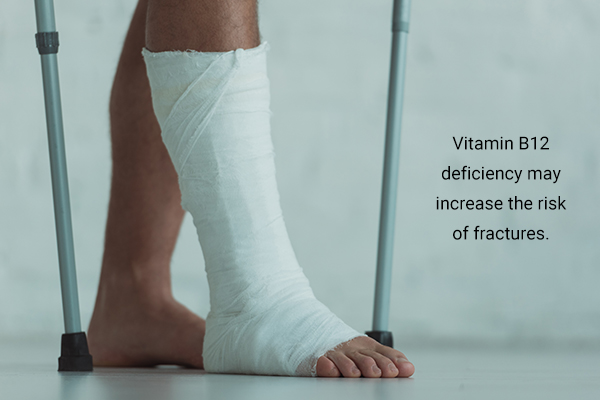In this article:
You may have already heard that calcium and vitamin D play important roles in the development and maintenance of healthy bones. But do you know of the unsung heroes involved in healthy bone development?

Maintaining strong bones involves the creation of new osteoblasts – cells that bones are made of, prevent bone loss, and strengthen the density of bones (bone mineral density). Along with calcium and vitamin D, your body needs protein, magnesium, phosphorus, potassium, fluoride, boron, copper, iron, zinc, and vitamins A, C, and K for developing healthy bones. (1)
However, newer findings have also attributed B complex vitamins, specifically folate, vitamin B6, and vitamin B12 for bone health. This article will explore exactly why B complex vitamins including vitamin B12 are needed.
Role of Vitamin B12 in Bones
Though there is no evidence of vitamin B12 directly influencing bone health or increasing bone density, experts suggest two possible ways in which vitamin B12 helps.
1. Reducing fracture risk
Homocysteine levels in the blood are a huge factor in developing fractures. It is an amino acid that enters the blood after the metabolism of dietary homocysteine. Studies done on over 800 participants found that elevated homocysteine levels were high in those with a fracture risk. (2)
Vitamin B12 along with folate and vitamin B6 can bring down homocysteine levels in the blood to reduce the risk of fractures, especially in older adults who are more prone to osteoporosis. (2)
2. Possible involvement in the creation of new bone cells
Though the exact mechanism by which vitamin B12 can create osteoblasts is unknown, some experimental studies on human cells have found vitamin B12 to increase the number of osteoblasts. (3)
In addition, a deficiency of vitamin B12 was associated with an increase in the activity of bone re-absorption, which is what happens to older bone cells in order to create new ones. (3)
Can Supplementation Help?

Your doctor can help identify a vitamin B12 deficiency that may increase the risk of developing fractures.
Increased vitamin B12 levels have been known to mildly reduce fracture risk by about 4%, (4) which could be useful in improving overall bone health when combined with bone-healthy foods that are rich in calcium and vitamin D.
Sources and Requirements
The Food and Nutrition Board identifies the daily requirements of vitamin B12 for men and women as 2.4 mcg, with a slight increase to 2.6 mcg in pregnant women and to 2.8 mcg in breastfeeding women. (5)
Vitamin B12 is abundant in dairy products such as milk, cheese, and yogurt and is better absorbed from these sources than from meats, organ meats, poultry, and fortified foods such as breakfast cereals and rice. (5)
Practical Takeaways
- Vitamin B12 along with folate and vitamin B6 are also implicated in bone health.
- Vitamin B12 can reduce fracture risk and possibly help in creating new bone cells.
- Including dietary sources of vitamin B12 can help reduce fracture risk.
- Vitamin B12 from dairy sources is better absorbed in the body than that from other sources.
- Was this article helpful?
- YES, THANKS!NOT REALLY


